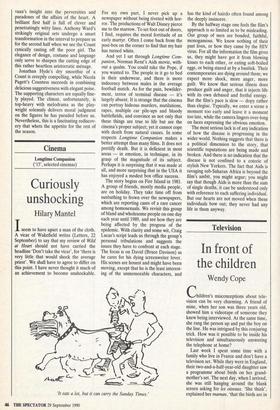Television
In front of the children
Wendy Cope
Children's misconceptions about tele- vision can be very charming. A friend of mine, when her son was three years old, showed him a videotape of someone they knew being interviewed. At the same time, she rang the person up and put the boy on the line. He was intrigued by this conjuring trick. How was it possible to be inside his television and simultaneously answering the telephone at home?
Last week I spent some time with a family who live in France and don't have a television set. While they were in England, their two-and-a-half-year-old daughter saw a programme about birds on her grand- mother's set. The next day, when I arrived, she was still hanging around the blank screen asking for les oiseawc. 'She think', explained her maman, 'that the birds are in
there all the time.' You switch on and all you will see is beautiful feathered creatures winging through the air. What a touching illusion.
Ideally, one would like all toddlers to be innocent of any knowledge of television. But, as it happens, I did recently come across rather a nice little programme for the age-group. Bump (BBC 1, 3.50 p.m., Friday) features a cuddly blue cartoon elephant, who falls over a lot. Among his friends are un oiseau and a dog called Macduff. In the programme I saw, Bump decides he would like to have a cloud of his own, so he can float through the air without tripping over. But he has to accept that this is an impossible dream, not only because (moral education) 'the clouds be- long to everyone' but also because (scien- tific education) 'clouds can't be sat on'. He makes do with a white balloon instead.
Bump got taped by accident. It comes immediately before the programme I was aiming for, the second in a new series entitled Corners (BBC 1, 3.55 p.m., Fri- day). Two frantically bouncy presenters attempt to answer questions sent in by children. 'Why do bananas bend?' At the end of the banana item I still didn't know why bananas bend, but I had learned, to my surprise, that a banana tree is really a giant herb.
The next two questions were about time. Tackling these in around three minutes was a more ambitious project than explaining about bananas. 'When anything moves or changes we have time.' Time is the measurement of movement.' I doubt if many eight-year-olds will have been any the wiser.
Another new Friday afternoon offering, How 2 (ITV, 4.25 p.m.), does the same kind of thing more successfully. The pre- sentation is calmer, on the whole, although Carol Vorderman's hurried demonstration of how to make a Baked Alaska could have passed muster as a comedy sketch. By the time she'd finished, however, I could have made one, given the inclination, and I understood why the ice-cream doesn't melt.
How 2 is the descendant of How, a pfogramme from so far back in the mists of time that I may have been quite young when it was broadcast. In those days the presenters used to imitate North American Indians, holding up one hand, palm for- ward, and intoning 'How' in unison. It was wise to drop this in the new version.
As for grown-up programmes, I haven't much to add to what everyone else said
about Portrait of a Marriage (BBC 2, 9.25
p.m., Wednesday). Except that I feel sorry for Nigel Nicolson, whose mother may not have been quite as loathsome as the character we saw on our screens. And I feel sorry for Janet McTeer (who plays Vita) because one or two reviewers were unnecessarily rude about her perfectly good face. But most of all I felt sorry for the nanny.



























































 Previous page
Previous page